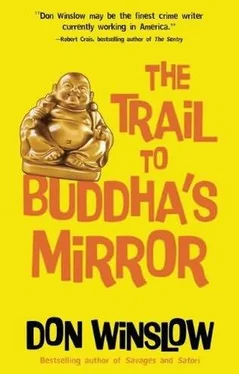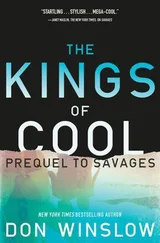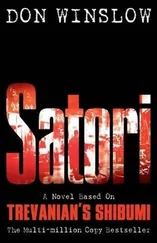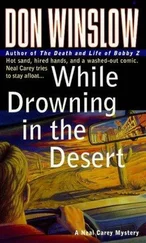Don Winslow - The Trail to Buddha_s Mirror
Здесь есть возможность читать онлайн «Don Winslow - The Trail to Buddha_s Mirror» весь текст электронной книги совершенно бесплатно (целиком полную версию без сокращений). В некоторых случаях можно слушать аудио, скачать через торрент в формате fb2 и присутствует краткое содержание. Жанр: Триллер, на английском языке. Описание произведения, (предисловие) а так же отзывы посетителей доступны на портале библиотеки ЛибКат.
- Название:The Trail to Buddha_s Mirror
- Автор:
- Жанр:
- Год:неизвестен
- ISBN:нет данных
- Рейтинг книги:3 / 5. Голосов: 1
-
Избранное:Добавить в избранное
- Отзывы:
-
Ваша оценка:
- 60
- 1
- 2
- 3
- 4
- 5
The Trail to Buddha_s Mirror: краткое содержание, описание и аннотация
Предлагаем к чтению аннотацию, описание, краткое содержание или предисловие (зависит от того, что написал сам автор книги «The Trail to Buddha_s Mirror»). Если вы не нашли необходимую информацию о книге — напишите в комментариях, мы постараемся отыскать её.
The Trail to Buddha_s Mirror — читать онлайн бесплатно полную книгу (весь текст) целиком
Ниже представлен текст книги, разбитый по страницам. Система сохранения места последней прочитанной страницы, позволяет с удобством читать онлайн бесплатно книгу «The Trail to Buddha_s Mirror», без необходимости каждый раз заново искать на чём Вы остановились. Поставьте закладку, и сможете в любой момент перейти на страницу, на которой закончили чтение.
Интервал:
Закладка:
Wu launched into his soliloquy right away.
“You can now see the outside of the Jinjiang Guest House,” he said before the driver started the engine.
“It’s nice to see the outside of something,” Neal said. Even the Jinjiang Guest House, which was a boring rectangular concrete box.
“The Russians designed it,” Wu said, as if reading Neal’s mind. He leaned over the seat and gave some directions to the driver, then looked at Neal with an expression that could only be described as “thrilled.” It occurred to Neal that he thought of Xiao Wu as a kid, even though they were roughly the same age.
That first morning they drove west along the north bank of the Nan River to Caotang Park, “home of the great Tang Dynasty poet Du Fu,” Wu explained as they got out of the car in a small parking lot surrounded by tall bamboo trees. They walked for few minutes and came to a small shrine beside a narrow creek. Wu explained that the shrine had been built to honor Du Fu, and that the only reason it wasn’t torn down by the Red Guard was that Mao had once written two lines of verse honoring the ancient poet.
“He was born in 712 and died in 770, but the shrine was not built until sometime around the year 1100.”
Neal flipped through his mental reference cards. Du Fu was writing poetry around the time of Charlemagne, and this shrine had been built to honor him around the time William the Conqueror had fought the battle of Hastings. When my Irish ancestors were running around in skins, Wu’s people were building a shrine to a poet because they had been reciting his work for four hundred years.
They lingered in the shrine for an hour, looking at a collection of landscape paintings that had been “lost” during the Cultural Revolution and had just recently been “found” and put on display. Neal thought briefly about Li Lan and wondered if she had ever stood here looking at these paintings. He shoved the thought out of his head and asked Wu to translate some of the other poems that were inscribed on wooden plaques. Wu did, and it turned out that old Du Fu was a dour fellow who wrote mostly about war, loss, and dislocation.
“He lived in a time of great chaos,” Wu said.
They wandered around the park for the rest of the morning. Wu dutifully recited the name of every plant and bird, although Neal could tell it didn’t interest him much. After a quick alfresco lunch of noodles, they got back into the car and drove to another park.
“Nanjiao Park,” Wu said. “Site of the shrine to Zhu Geliang.”
Neal knew his cue.
“Who was Zhu Geliang?”
“Come see.”
They walked a path through a lush garden to a large, imperial red shrine where a large painted statue of a soldier sat complacently.
“Zhu Zeliang was a great military strategist during the Three Kingdoms era that followed the demise of the Han Dynasty. Chengdu was the capital city of one of the Three Kingdoms, the state of Shu Han.”
“When was this?”
“Zhu lived from 181 to 234, but the shrine was not built until the Tang Dynasty.”
“About the time Du Fu was writing.”
“You have a good memory. Yes, that is correct. Chairman Mao had the shrine completely repaired in 1952. He was a great admirer of Zhu Geliang’s military thought, and he would send young officers here to learn from Zhu’s writings.”
Sure enough, Neal thought as he looked around, there were a number of PLA officers scribbling earnestly in their notebooks from plaques on the wall. Neal found himself staring at them and getting sidelong glances in return. But there they were, he marveled, taking notes directly from writings that were almost two thousand years old.
Wu walked him around the park, again pointing out the various flora and fauna. They strolled the edges of ponds that had fallen into disrepair and were just now being revived. Then they stopped for tea at a newly reopened pavilion that needed some roof patching and a good cleaning. But the few customers who were there on this working day didn’t seem to care. It was enough to get a cup of green tea and sit at the bamboo tables as a waitress came along with a kettle of hot water for refills.
Wu let the water steep in his lidded cup for a minute or so, and then poured the contents on the ground. The dark green tea leaves stuck to the bottom of the cup. The waitress refilled it, and Wu waited another minute before repeating the process. After the next refill, he let the cup sit for a few more minutes, removed the lid, and took a deep sip. Then he smiled with satisfaction.
“The first time, it’s water,” he said. “The second time, it’s garbage. The third time, it’s tea.”
They drank a few cups, talked about Huckleberry Finn and Innocents Abroad, complained about the vicissitudes of college life. Turned out that Wu was a recent graduate of Sichuan University, where he had studied tourism. His father had been a professor of English, had been in jail for it, and was now a room service waiter in a Chengdu hotel. But the authorities, realizing that they would need English-speakers to service the tourist trade they now coveted, pulled Wu’s file from a thousand others and admitted him to university. A job with CITS, the China International Travel Service, followed straight away. Wu’s great ambition was to become a “National Guide,” one of the elite cadre who escorted tourist groups for their entire stay in the country.
“Right now,” he explained, “I am just a local guide, authorized for Sichuan only. But I would very much like to see the rest of China, especially Beijing and Xian.”
“They put your father in jail for teaching English?” asked Neal, who knew a few English teachers who could profit from the experience.
“For speaking English.”
“Why?”
Wu shrugged.
“Cultural Revolution,” he said, as if the phrase explained everything.
“Do you think he’ll ever get his teaching job back?”
“Perhaps.”
I guess they don’t have tenure in China, Neal thought. In the States, once a professor got tenure, you couldn’t fire him if he buggered a goat on his desk during a lecture. You couldn’t get him out of that professional chair with a tow chain and an ox. But here you had English professors getting the sack for… speaking English.
“So what do you think about Mao now?” Neal asked.
Mao now? How now, Mao?
Wu stared at the table. “He liberated the nation, but he made some mistakes, I think.”
Wu was so clearly uncomfortable talking about it that Neal let it drop. It wasn’t the time to push. At this pace, there’d be plenty of time for that later. Nobody seemed to be in any hurry, that was for sure. What were they waiting for, he wondered.
Wu must have figured the conversation had gone on long enough, because he brought them back to touring with a vengeance. They hit the Cultural Park and the tomb of Wang Jian, a Tang Dynasty mercenary and self-styled emperor. They dropped in on the Center of Traditional Chinese Medicine, which served to refresh Neal’s memory of his bout with acupuncture. They wrapped the afternoon up with a visit to the People’s Park, where seemingly thousands of would-be swimmers were jammed shoulder-to-shoulder in three Olympic-size pools.
“You sure have a lot of parks in this town.”
“Chengdu people like to relax.”
They were driving back to the hotel when Wu casually pointed out the Xinhua Bookstore.
“The what?” Neal asked. “Did you say ‘bookstore’?”
“Xinhua Bookstore, yes.”
“Stop the car.”
Neal noticed that the driver hit the brake just a half-second before Wu gave the instruction.
“Let’s walk,” Neal said.
“You are not tired?”
“Suddenly I have all sorts of energy.”
Читать дальшеИнтервал:
Закладка:
Похожие книги на «The Trail to Buddha_s Mirror»
Представляем Вашему вниманию похожие книги на «The Trail to Buddha_s Mirror» списком для выбора. Мы отобрали схожую по названию и смыслу литературу в надежде предоставить читателям больше вариантов отыскать новые, интересные, ещё непрочитанные произведения.
Обсуждение, отзывы о книге «The Trail to Buddha_s Mirror» и просто собственные мнения читателей. Оставьте ваши комментарии, напишите, что Вы думаете о произведении, его смысле или главных героях. Укажите что конкретно понравилось, а что нет, и почему Вы так считаете.












